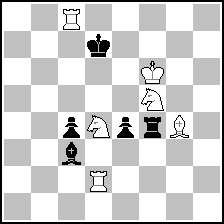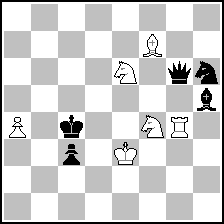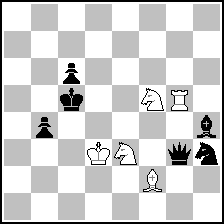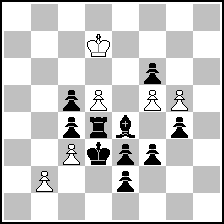
Website founded by
Milan Velimirović
in 2006
23:23 UTC


| |
MatPlus.Net  Forum Forum  X-Files: Anticipations X-Files: Anticipations  Plagiators? Plagiators? |
| |
|
|
|
|
You can only view this page!
| | Page: [Previous] [Next] 1 2 | | (1) Posted by Frank Richter [Tuesday, Mar 27, 2007 08:17] | Plagiators?
At Jan Golhas website we may read the topic "Plagiators" (http://www.goja.sk/p33a.htm). In the last days in this section were added the names of A. Pankratjev and J.F. Baudoin.
If you screening through the examples - what is your opinion? Can we really call them "Plagiators"? They composing especially helpmates - and a lot of h# already exists and are available for research.
And is the following conclusion true: "Mr. Pankratev deals with such topics that were worked many times and due to this it is possible to mark his chess problems as plagiats." ?
| | | (2) Posted by Hauke Reddmann [Tuesday, Mar 27, 2007 11:34] |
I'm chuckling at the thought that Pankratiev sues Golha for
slander (or was it libel? Never know the difference) and a
jury has to name some problem experts on the matter :-)
I would be overcautious with such accusations, even the
famous "shift-and-mirror" isn't a proof as such - you can
guess my dismay when for one of my latest SCHWALBE 2# an
*exact* mirror by Ellerman (Old Hauke steals only from the
creme de la creme :-) popped up. It's not even the only
example, only the most embarassing (I documented all
anticipations I came to know of on my website).
Of course noone (caring for their front teeth :-) accused
me of plagiarism, giving me the benefit of doubt that
a) I like the grazed fields of classic 2# (so Golhas remark
is inconclusive in analogy), b) I have a computer memory
and probably each twomover I ever saw spooks around in my
subconcious, not to mention c) there are natural "Letztforms"
for certain themes that set up themselves.
Hauke
| | | (3) Posted by Michael McDowell [Tuesday, Mar 27, 2007 12:16] |
The trouble is that too many composers are too lazy to make the effort to check for anticipation, and prefer to rush into print and let others do the work of finding predecessors for them.
I have always found that people with large collections are happy to help with originality checks. In the helpmate world there is Chris Feather and Zivko Janevski; doubtless Udo Degener can help with two-movers, and there may well be such people in other genres.
The onus is on the composer to check his problem for originality in advance, especially if he is working in a well-covered area.
| | | (4) Posted by David Knezevic [Tuesday, Mar 27, 2007 14:01] |
Recently I exchanged several email messages with Guy Sobrecases, who is a member of our MatPlus community, and was impressed how much time and effort he invested in researching this area. Many of you probably received his emails with informations about his discoveries.
One argument more for a necessity of a global and well organized public database (mentioned elsewhere in our Forum), accessably by everybady at anytime.
| | | (5) Posted by Harry Fougiaxis [Tuesday, Mar 27, 2007 16:29] |
Regarding the case of Pankratiev, personally I would not call him "plagiarist", at least in the extent that Strebkovs (recently) or Stadelmaier (in the 80s) used to be. However:
1. We should not ignore that at least 30% of his problems are "photo"-anticipated. Most of them are indeed helpmates, but I can recall many awards where direct #2 and #3 of him were disqualified as exact anticipations.
2. He has another very bad and totally unacceptable habit; he systematically sends the same problems (or insignificant versions of them) to more than one magazine for publication, or he sends them to both informal and formal (jubilee, memorial, etc.) tourneys at the same time. I have also noticed that quite frequently he first sends a problem for publication and soon after a slight version, with a co-author, to some other magazine.
I made my own statistics during the FA 2001-03 evaluation process and the above facts can be easily documented and supported. My own experience as editor of Mat Plus; he sent to me 10 problems: 3 were completely anticipated (incidentally, all by Chris Feather's compositions...), 3 had been already published elsewhere and the rest 4 were under average quality, or they had serious constructional defects.
| | | (6) Posted by Sarah Hornecker [Tuesday, Mar 27, 2007 17:12]; edited by Sarah Hornecker [07-03-27] |
Hauke, you're a plagiator! (just kidding)
I composed some chess problems back in 1998 or 1999. When I sent it in, it was found two of the three I sent in were anticipated: the #9 by Speckmann, the #3 by Naef (if I remember correctly). Only the #7 wasn't anticipated. In the following months Martin Hoffmann and me made a #9 out of it and it was published.
So at a rate of 2/3 problems anticipated it's easy to be suspected of plagiarism. When I really plagiarized it was just because I didn't know the correct author to give (I gave "after author, tourney" instead of "author, tourney, correction by SH"). Well, I should've given the whole original problem to the editor but at that time I didn't know that I had to do that. Later, I corrected the mistake (and of course the readers noticed it, too).
Regarding Strebkovs (and Senkus, and Stadelmaier) we can be sure they're plagiarists.
Pankratev - well, some look clearly like plagiats but the others seem to be own helpmates (well, I'm not an expert at that). I think it just could be coincidence. There's a certain suspection but imo no proof. Maybe he just has seen it somewhere and later on thought it to be his own creation. Or he corrected / improved it and forgot to give the original author...
For Baudoin the case also looks clearly like plagiarism most of the time.
| | | (7) Posted by Harry Fougiaxis [Tuesday, Mar 27, 2007 22:47]; edited by Harry Fougiaxis [07-03-28] |
...For Baudoin the case also looks clearly like plagiarism most of the time.
And he apparently does not even know how to copy... In most of the examples, he either strips one or more solutions from the original work to make his own version look more economic, or he adds one totally unrelated solution. How pathetic :( (sorry for my french!)
| | | (8) Posted by Sarah Hornecker [Wednesday, Mar 28, 2007 05:12] |
(sorry for my french!)
Your french sounds like english to me. ;-)
Yes, I also was wondering about his way of "correcting" the originals by destroying content. At the last example he even took out a rundlauf...
| | | (9) Posted by Hauke Reddmann [Wednesday, Mar 28, 2007 11:26] |
@Michael McDowell:
Guilty as charged - but unpractical as suggested.
I took for granted that big journals like SCHWALBE do an
anticipation check for their stuff anyway, en bloc.
Poor Udo Degener if he would be bombarded with "Is that new?"
for each and any twomover on earth. (I will be the first
to order the 2# CD announced...)
Thus I rather seldom ask Udo directly and warn the editor
when I suspect myself something *might* be anticipated.
(And I am sooooo fresh and original anyway :-)
Hauke
P.S. Ellerman incident: First print in Arbeider-Skak,
construction full of wizardry - I neither had a chance
to know it nor the slightest suspicion of anticipation.
| | | (10) Posted by Iļja Ketris [Thursday, Mar 29, 2007 19:29]; edited by Iļja Ketris [07-04-19] |
I disagree with accusing Pankrat'ev of plagiarism. Having started composing helpmates myself only recently, I had more anticipated problems than not on my own account at first.
There is no straightforward procedure for anticipation checks that would be universally embraced. Very few people have personal collections large enough to do anticipation checks themselves. Fewer people still would find it feasible to contact Feather/Degener or anyone else in order to check every new problem.
Surprisingly many people has no Internet access, and what's even more shocking, not everyone speaks English in order to ask favors.
If you don't work, have no Internet and live in Russia, for example, sending a letter abroad may cost you a certain fraction of your social security payments. If you multiply it by number of problems to check, the costs may be prohibitive.
Even when you are lucky to have these abilities, you can never be sure. I have sent a problem once to a reputable magazine, and the anticipation check done by a very reputable person yielded nothing, although the position looks like it just can't be not anticipated. So after approval, I find the anticipation myself, however limited resources I had. Guess whom I was anticipated by? Aleksandr Pankrat'ev. And not once, but twice:Iļja Ketris, 2006
 (= 6+5 ) (= 6+5 )
h#2, 2.1.1.1
1. Rxg4 Se7 2. Bxd4+ Rxd4#
1. Bxd2 Sb5 2. Rxf5+ Bxf5# | Aleksandr Pankrat'ev
Probleemblad, 1996
 (= 6+5 ) (= 6+5 )
h#2, b) Ke3->d6
a) 1. Q*g4 Sd3 2. Q*e6+ B*e6#
b) 1. Q*f7 Sc5 2. Q*f4+ R*f4# | Aleksandr Pankrat'ev
2002 MT L.Apro-G.Cseh-V.Schneider, 2nd Comm
 (= 5+6 ) (= 5+6 )
h#2, b) Kd3->e6
a) 1. Q*f2 Sc4 2. Q*f5+ R*f5#
b) 1. Q*g5 Sd6 2. Q*e3+ B*e3# |
Was my problem anticipated? Probably. But was Pankrat'ev anticipated by himself? Positively yes. But does it qualify as plagiarism? I don't think so. It may be described as unscrupulous practice, at most.
While we have no universal centralized database that we could use to check all the new problems to check against, we will be running into that over and over again. Everyone should be able to look for predecessors in a simple and streamlined fashion.
| | | (11) Posted by Harry Fougiaxis [Thursday, Mar 29, 2007 22:56] |
Apparently Pankratiev considered that he should self-quote his problem even more widely, so he sent it to one more tournament. I refrain myself of making any further comments on his behaviour...
Aleksandr Pankratiev
3 HM E. Lebedkin MT, Uralsky Problemist 1996
 (= 5+6 ) (= 5+6 )
h#2
b) Kd3>e6
a) 1.Qxf2 Sc4 2.Qxf5+ Rxf5#
b) 1.Qxg5 Sd6 2.Qxe3+ Bxe3#
Nevertheless, such a matrix is so classic that there is very minimal hope that something original may come out of it. Compare, for instance, to the following anticipated problem by one of the leading composers in the modern h#2 field.
Valery Gurov
3 Pr Best Problems 2000-01
 (= 7+6 ) (= 7+6 )
h#2
2.1.1.1
1.Qxf6 Sd3 2.Qxc6 Rxc6#
1.Qxc7 Sb4 2.Qxe5+ Bxe5#
| | | (12) Posted by Sarah Hornecker [Thursday, Mar 29, 2007 23:25]; edited by Sarah Hornecker [07-03-30] |
This is cheating! Nothing else! It's not as bad as plagiarism but it still could even be illegal (to law) in some cases (in Germany it is if it was asked for originals and money is to be awarded).
PS: The biggest plagiators are still Raimondas Senkus and James Alexander Porterfield Rynd!
| | | (13) Posted by Iļja Ketris [Friday, Mar 30, 2007 02:04] |
Thank you Harry, it's comforting to see that my setting is not worse than Gurov's :)
| | | (14) Posted by Guy Sobrecases [Wednesday, Apr 18, 2007 01:38] |
Thank you Milan for your kind words. That's right that I have spent some time on this topic.
Jan must be also thanked for his action, managed for many months on his website.
Concerning the cases of the helpmates of Mr A.Pankratiev and Mr JF Baudoin, most of their prize awarded problems are anticipated according to the following parameters:
- Same matrix
- Similar material
- Same solution
This does not include the anticipation of ideas that can be a matter of subjectivity.
At least 50 "originals" are anticipated according to the same a/m parameters.
This number is today over 100 for Mr A. Pankratiev.
I do not know any other case of helpmate composer having over 50% of his prize awarded problems anticipated, and more than 50 anticipations found in the Winchloé database. -The Winchloé database is not exhaustive with today less than 30% of the edited problems recorded, in spite of the fantastic work of the Winchloé collaborators-.
Regarding the moral aspect of plagiarism, I have personnally no judgement. This work has been achieved mainly to help the editors.
About the difference between a plagiarism and an anticipation, I do not see any, case by case. I think that the examples mentionned by Ilja and Harry are very good ones. It clearly shows that the discrimination between a plagiarism and an anticipated problem is quite impossible.
That means for me that plagiarism, reduced to one problem, does not exist.
Only plagiarists, and for their whole career. It seems that they are very few in the helpmate composing.
PS: A similar article has been open in the French forum "France Echecs" by Alain Pallier. The doubts about the plagiarist status are rather concerning our domestic composer Mr JF Baudoin than Mr A.Pankratiev :-)
| | | (15) Posted by David Knezevic [Friday, Apr 20, 2007 12:17] |
Chris Feather wrote in his e-mail to me: The word "plagiator" (which is used on the website) is not correct English! The correct term is "plagiarist". Also, the correct term for the act of plagiarising is "plagiarism". ("Plagiat" is not English!) Perhaps this could be mentioned on the website?
Thank you Chris, the clarifications are always useful and welcome. However, I would like to encourage the broken-English-speakeng members (including me, I could be even a leader of that group!) not to hesitate to express their opinion in as good/bad English as they can since it is still the only "Esperanto" we have :)
... but also to try to improve their English learning from advices like this one by Chris!
@Guy: You are doing a great job, we are looking forward for your reports in the future!
| | | (16) Posted by Sarah Hornecker [Saturday, Apr 21, 2007 02:37]; edited by Sarah Hornecker [07-04-21] |
Frank Richter and me are german, so this should explain the mistake. The term "Plagiat" (note in german nomens have a capital letter first unlike in english) is used there and the mistakes result most probably on a wrong translation (like translating "Zugzwang" as "moveforce", as an example). It just seems to be correct to it is used without looking up in a dictionary. For more such words, see:
http://en.wikipedia.org/wiki/List_of_false_friends
http://de.wikipedia.org/wiki/Liste_falscher_Freunde#Englisch
(the second URL is from a german point of view)
| | | (17) Posted by Hauke Reddmann [Tuesday, May 8, 2007 17:52] |
@Guy Sobrecases:
I'm quoting from an article by Marian Kovacevic in Problem-Forum 3/07:
"My first 100 problems (1970-73) usually were miniatures of all kind.
I guess that about 10% of them survived an anticipation check."
So even a mass of anticipations doesn't conclusively prove plagiarism.
Hauke
| | | (18) Posted by Guy Sobrecases [Wednesday, May 9, 2007 01:04] |
You are right. I have omitted to mention this point here, when I mentioned it on the France Echecs website:
But few exceptions, miniatures are of course excluded in the list of anticipated problems of Mr Pankratiev and Mr Baudoin.
| | | (19) Posted by Steven Dowd [Saturday, Jun 9, 2007 15:57] |
I am coming late to this discussion because I recently found a great miniature that survived WinChloe, the PDB, and a few experts, including Harry, who applies the sort of analytical force one expects from an artist and editor of the highest caliber.
I remember that Petkov once wrote that the greatest defense against anticipation is trying to be original - but he's Petkov! And like in academia, it seems that the "popular" does better than the "good" both in getting accepted and in prize awards (I normally don't care for such things, but a problem I was sure would be "direct to FIDE" didn't even make it into the awards of a magazine; how often do you see a h#10 with two full length, different set-plays.. yes, a h#10** - but that is perhaps another story).
I went to Golha's site to see if the original sentence Frank Richter mentioned in his first post was still there. It was, and I am surprised, as it seems to be an actionable statement, as Haukke noted in jest.... Some writers do very well, like the American author Stephen King (who called himself "the literary equivalent of a Big Mac and Fries") by churning out the same hack stuff... but people buy it up, in droves.
But in a recent EG, there was a composer spoken of, not in ill terms, who had devoted his life in studies not to one piece configuration, one theme, but one matrix, for several decades. But what some would see as self-plagiarism was seen by the expert writing the article as one composer who was making important inroads into, yes, a very narrow field. He'll never win a FIDE title, but perhaps he (forgive me for this sacrilege) is making a better contribution to endgames and studies than some who will or do?
It's easy to check for anticipations in some cases - I just did two what I consider to be "Speckmann" longmovers - so of course I check all Speckmann material I have, but what if someone else did it ala Speckmann? The kind of Roman/Lenkungsmaneover I used is not a new idea, but I think it is shown here in a new way (and a very pretty one)? But am I right? I looked in all the German books I had (and had a few Germans look at it!!), and couldn't find anything. I think on one of these fora Haukke also said, flippantly, but with some right, "let the editors sort it out!"
But sometimes when I went original (like my Kegel selfmate phase), or when I do original longmover helpmates, I often receive bad reviews from the solvers/readers/judges. I would contend that they often don't see the originality, but to any artist, it is hard for "the public" not to matter. How often can you say, well, in 100 years, someone will....???
I'll simply finish my story by saying I have now become one of those folks who have to "sort it out." One of my jobs is now h# editor for ST, and I will let you fill in the blanks as to what arrived in the mail yesterday from a far-away land!
| | | (20) Posted by Harry Fougiaxis [Friday, Jun 15, 2007 23:56] |
One recent photo-anticipation which escaped the judge's attention.
Accidental or not, I don't know, but Pankratiev's problem is, in any case, quite inferior to the forerunner. | | Aleksandr Pankratiev
6-10 HM V. Abrosimov-65 JT
Shakhmatnaya Poezya 2007
 (= 6+10 ) (= 6+10 )
h#4
2.1.1...
1.Kc2 gxf6 2.Rd2 f7 3.Kd3 f8=Q 4.Bxf5+ Qxf5#
1.Kd2 g6 2.Bc2 g7 3.Kd3 g8=Q 4.Rxd5+ Qxd5# | Kostas Prentos
Kevin Begley
1 Pr StrateGems-5 JT 2003
 (= 4+14 ) (= 4+14 )
h#5
2.1.1...
1.Kf2 b5 2.Re1! b6 3.Ke2 b7 4.Bf2 b8=Q 5.Ke3 Qxe5#
1.Ke2 b5 2.Bg1! bxc6 3.Kf2 c7 4.Re2 c8=Q 5.Ke3 Qxc5# |
Btw, this specific combination of gate-opening followed by switchback was asked for the h#3 round of Liga Problemista 1982. Marko Klasinc set the theme and judged the tournament, so sometimes you may notice this manoeuvre mentioned as the "Klasinc theme".
|
Read more... | Page: [Previous] [Next] 1 2
MatPlus.Net  Forum Forum  X-Files: Anticipations X-Files: Anticipations  Plagiators? Plagiators? |
|
|
| |
| |
 ISC 2024
ISC 2024 Forum
Forum  X-Files: Anticipations
X-Files: Anticipations  Plagiators?
Plagiators? 


